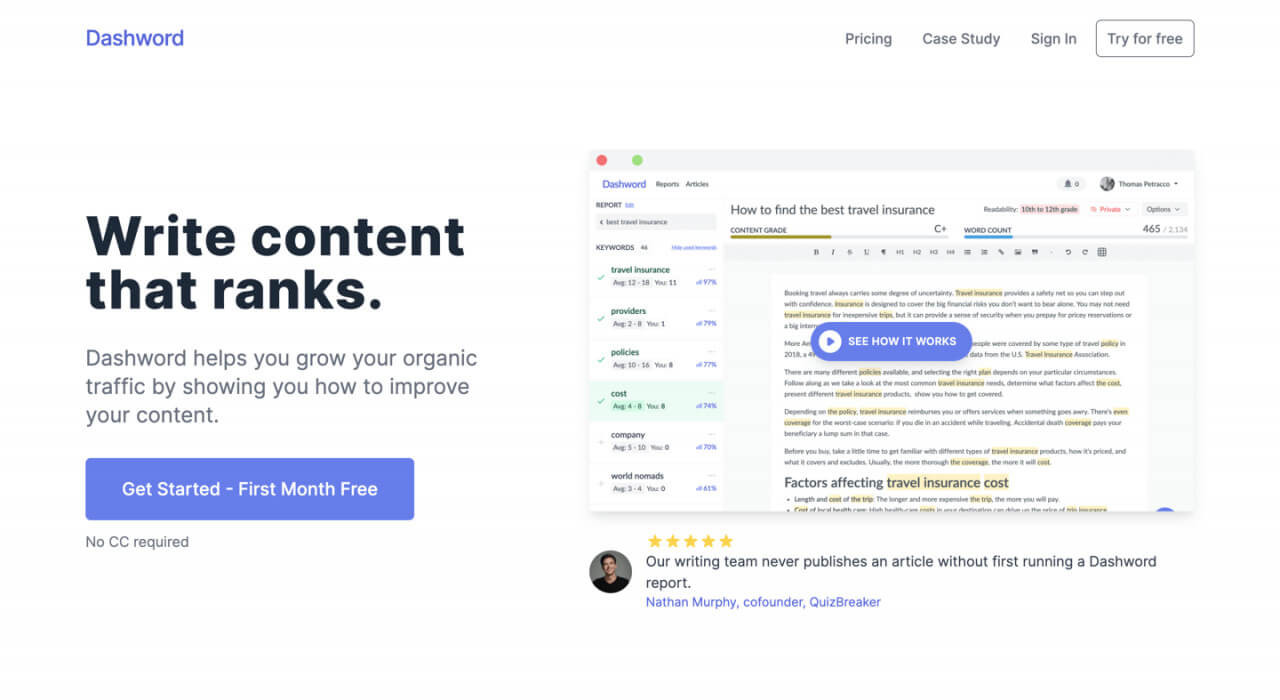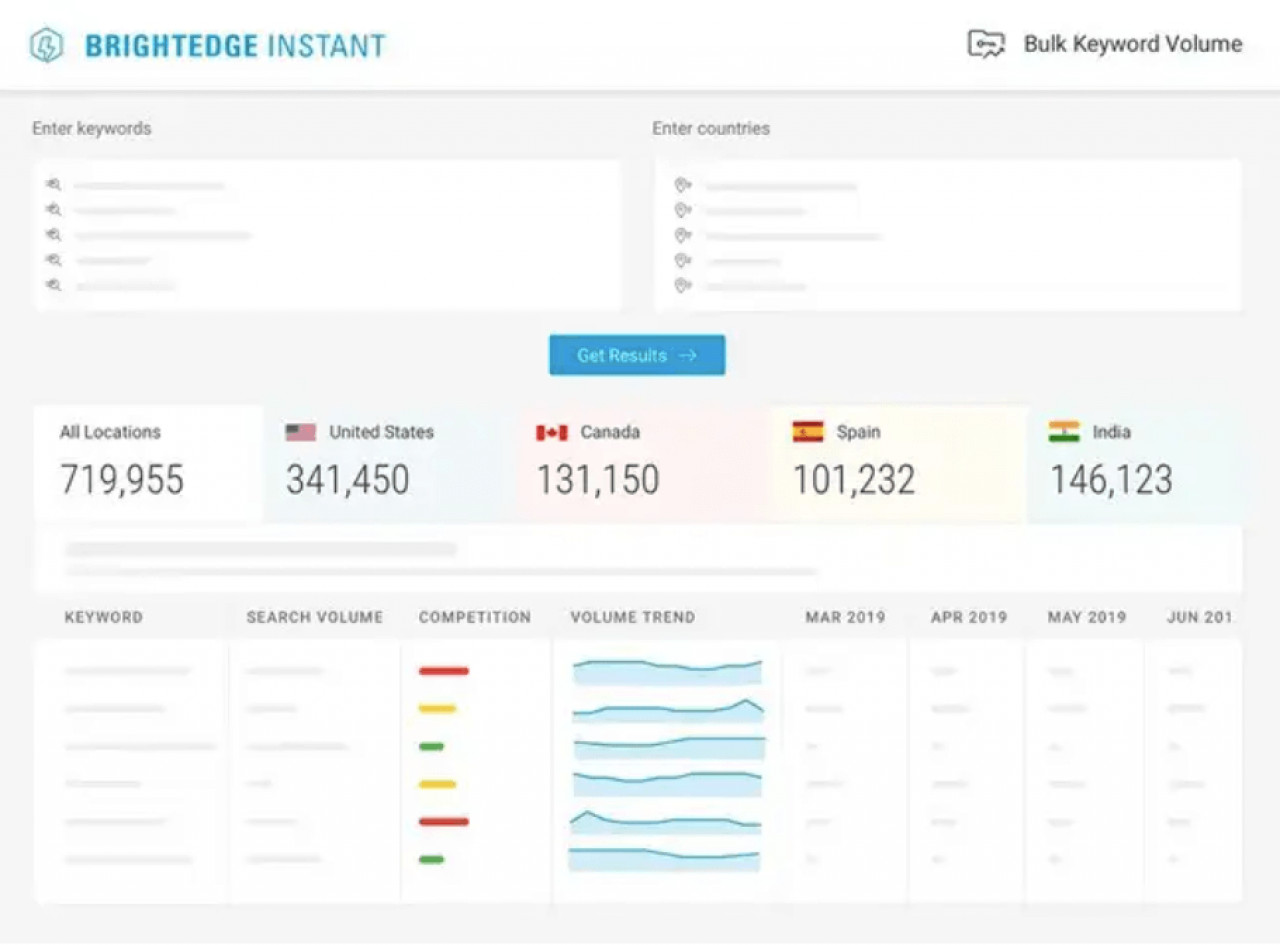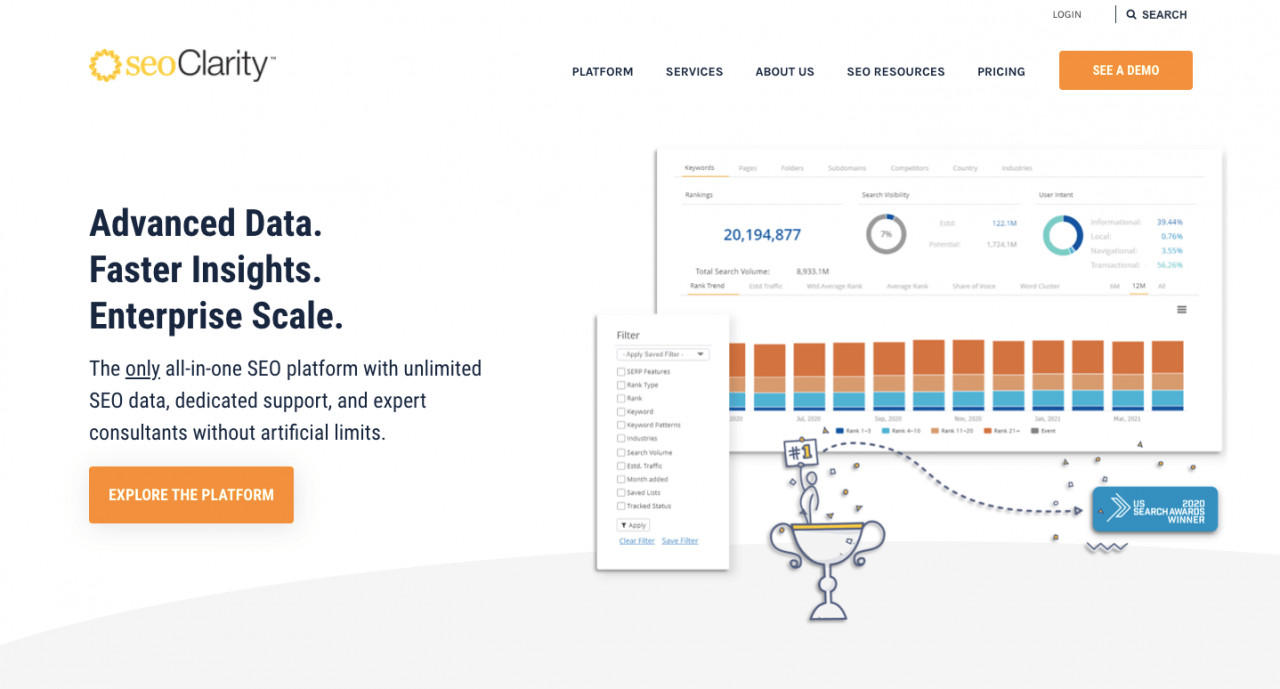93% of every online experience starts from a search engine. This just goes to show that SEO is monumental to your business growth.
Perfecting SEO is no easy feat.
We’ll start by explaining what enterprise SEO entails and then get down to the tactics and tools that will power you through.
What is enterprise SEO strategy?
Enterprise SEO is the SEO strategy that you implement to drive organic traffic to an enterprise site (a relatively larger website). It's an important part of enterprise marketing and includes in-depth and stringent keyword research, competitor analysis, project management to building a strong interlinking structure, and much more.
The fundamentals, the technique, and the SEO tools that you will use are pretty much the same as you would use for traditional SEO.
That said, when it comes to the actual execution and strategies that you will employ for enterprise SEO, there are primary differences from traditional SEO - that are worth looking into.
Enterprise Vs. traditional SEO
Enterprise SEO transcends regular SEO activities and needs to be carried out on a much larger scale. Let’s look at how enterprise SEO is different from traditional SEO:
Need for more stakeholders
The immense scope and demand of larger websites bring us to the need for a bigger team to pursue an enterprise SEO strategy.
In traditional SEO, you can make do with a smaller SEO team, with each team member looking into multiple aspects of search engine optimization. Unlike traditional SEO, enterprise SEO needs a much larger team of SEO experts with each team member dedicated to a particular function.
For established organizations that are dealing in multiple products and offerings, the need to optimize each of their web pages requires niche-specific knowledge. Ideally, an SEO agency is preferred to carry out enterprise SEO efforts.
Short-tail, highly competitive keywords are targeted
One stark difference between the two is the type of keywords that are targeted. Smaller websites usually go after long-tail keywords that are easy to rank for.
Whereas, when you’re catering to the needs of a large website, your focus could also include short-tail and highly competitive keywords that are relevant to your business goals, assuming your budget allows for it. All your content creation activities will be driven with these target keywords in the backdrop. These short-tail keywords are typically one or two words long and more generic.
We’ll help you understand this better with an example.
Say you’re in the business of selling backpacks - ‘travel backpack with laptop compartment’ would be a long-tail keyword. ‘Backpack’ is a short-tail keyword that has a much higher search volume and is undeniably tougher to rank for.
Broader scope and higher investments
When compared to SEO for small or medium-sized organizations, enterprise SEO requires more time, effort, and larger investments of money. While competition and challenges are plenty, there is also that much bigger an opportunity to reach out to a greater audience.
With bigger markets to cater to and a sheer number of pages to optimize, building scalability into your SEO efforts and content strategy is a must. This can be done by doubling down on SEO tools and workflows that are built to help you climb up the search rankings.
What does enterprise SEO include?
We’ll now take a closer look at the unique traits that set enterprise SEO apart.
Plenty of pages to optimize
When you think of enterprise SEO, think of a gazillion pages to optimize!
Now when it comes to content creation, bear in mind that you may have a lot of similar content, taking on the same topics from a different angle. This is inevitable at the enterprise level and is fine. You can go ahead and interlink the pages with similar topics to give your users more resources to fall back on. Having said that, you need to make sure that there is no duplication of content across your web pages. No two web pages can have the same content. Every page must have original content and the target keywords need to be unique.
Plus: when you’re working with too many pages, there are chances that you may miss out on optimizing some. Maintain a tracker and set in a process to ensure that all your pages are optimized from time to time.
The astronomical volume of data
If you want your enterprise SEO to work then you need to be able to analyze and optimize the gold mine of data that you have. It is certainly a herculean task considering the dozens of pages that you need to optimize, but nothing is more important than being on top of all the data and tweaking them to match Google’s ever-evolving algorithm.
Extremely picky keyword selection
Keyword research is always a priority and when it comes to enterprise SEO, selecting your target keywords becomes a lot more critical. Why?
Your choice of keywords needs to closely match the search intent. With competition at its peak, you need to study the keyword search volume and the ranking difficulty before you select your target keywords.
5 effective tactics for enterprise SEO
Aim for ‘striking distance keyword’ rankings
 Source: Search Engine Journal
Source: Search Engine Journal
In your attempt to rank higher in search results, drive in more organic traffic and increase conversions - targeting ‘striking distance keyword’ will fetch you immediate results.
These are keywords that rank in positions 11-20. Keywords that rank in the triking distance offer a great opportunity for increased visibility and traffic. Along with strengthening your on-page content, you can look at optimizing your title tags and header tags by including these ‘striking distance keywords’.
Expand short content pages to cover more keywords
Pages with thin content or empty pages with just a few lines of content make ranking in search engines a nightmare!
Publishing pages just for the sake of publishing could hurt your enterprise SEO strategy more than you can imagine.
Once you have selected the ‘striking distance keywords’ that you’d like to rank for, go ahead and build content on thin pages to make them more relevant and in line with the user's search intent. Give users what they came for - meaningful, high-quality content that will not only ensure a good user experience and high engagement rates but will also help in improving your website’s domain authority.
Target featured snippets
A featured snippet promises great exposure as it appears before the organic search results and also pops up for voice search.
To appear as a featured snippet, address the user’s search queries in the content that you publish. Ensure that you are directly responding to user queries about a particular topic in a structured format - go ahead and use lists and graphs if you must.
With Dashword you will be able to spot the frequently asked questions easily and tweak your content to answer these questions and similar queries clearly and concisely.

Bring down no-value pages
When you’re working at an enterprise scale, you will be dealing with multiple domains and web pages that are adding no value to the user or are irrelevant to your changing business needs.
Conduct frequent content audits and remove these outdated pages to keep your site’s domain health in check.
Perform regular site health checks
For enterprise SEO to be successful, you need to be on the watch always! Ensure that you are running regular site health checks including content and internal linking audits.
Check up on your sitemap, page speed, 404s, and ensure that all your web pages are crawlable and are in perfect condition to be indexed!
Top 7 enterprise SEO tools
When it comes to picking the right tool for your enterprise SEO strategy, you need to ensure that you pick one that is great for large-scale projects and can be easily scalable as your business grows. There's a number of SEO platforms out there but not all of them are worth the money or your time.
Here are our top picks.
Dashword

Dashword is packed with an advanced set of features that enable SEO optimization and team collaboration at scale.
Growing organic traffic with high-quality content that matches the search intent will never be a problem with a tool like Dashword. For every keyword report that you create you get to know the trending topics, relevant terms, and frequently asked questions from the top 30 Google results for that keyword.
You also get to see the content score of each result. With an in-built content editor, you get real-time recommendations to churn out top-ranking content.Ace your enterprise SEO strategy with Dashword
Search engine optimization that is carried out at an enterprise level, comes with a lot of challenges - which is why the need for a well-thought-out strategy is imperative to optimize the zillion web pages and increase your search engine visibility.
Get started for free on Dashword today and enjoy the tremendous impact it will have on your rankings, organic traffic, and conversions.
Ahrefs

When it comes to backlinks analysis, Ahrefs rules the roost with a rich pool of backlink data enabling you to easily track your competitors’ backlinks and discover new backlink opportunities for your enterprise.
Ahrefs’ site audit and powerful recommendations are great to fix technical issues across multiple web pages. Scalability is not a problem as their enterprise plan comes with 20,000 keywords and the ability to take on unlimited projects, which means you never have to worry about exceeding data limits.
BrightEdge

BrightEdge offers an integrated suite of solutions like real-time recommendations on rankings and searches volume to help large teams scale their SEO optimization efforts seamlessly and measurably. Their enterprise SEO software is the go-to for large companies without budget constraints.
BrightEdge also helps teams identify how they are fairing when compared to the competition on non-search sites like Amazon and Youtube. This helps you develop fitting content strategies across all mediums and not just for search engines alone.
BrightLocal

If you’re an enterprise looking to win at local SEO, then look no further. BrightLocal was designed specifically to help you get an edge over your competitors in local search rankings.
Unlike other tools, BrightLocal’s analysis of local search is a class apart. The tool audits every inch of local SEO and presents the complete picture in minutes to help you generate more traffic from search queries that have local intent.
Botify

Botify helps businesses optimize large websites with features like crawler and log file analyzer. The tool also offers an integration with Google Analytics allowing you to track your site’s performance over time.
You can even evaluate and track the changes to the content of every page with the help of Botify’s crawler.
seoClarity

seoClarity provides workflow management for easy team collaboration along with other features like log file analysis and a content marketing suite.
The tool analyses historical data and keywords with the help of machine learning algorithms and offers rich insights to improve on-site SEO.
Conductor

Conductor helps you zero down on trending topics, using which you can build a custom dashboard to fine-tune your enterprise SEO strategy.
With the interface of a social media channel, Conductor makes communication within the platform easy. ‘Insight Stream’ is a noteworthy feature that shares a feed of real-time recommendations by gathering data from various tools that are built into the Conductor platform.